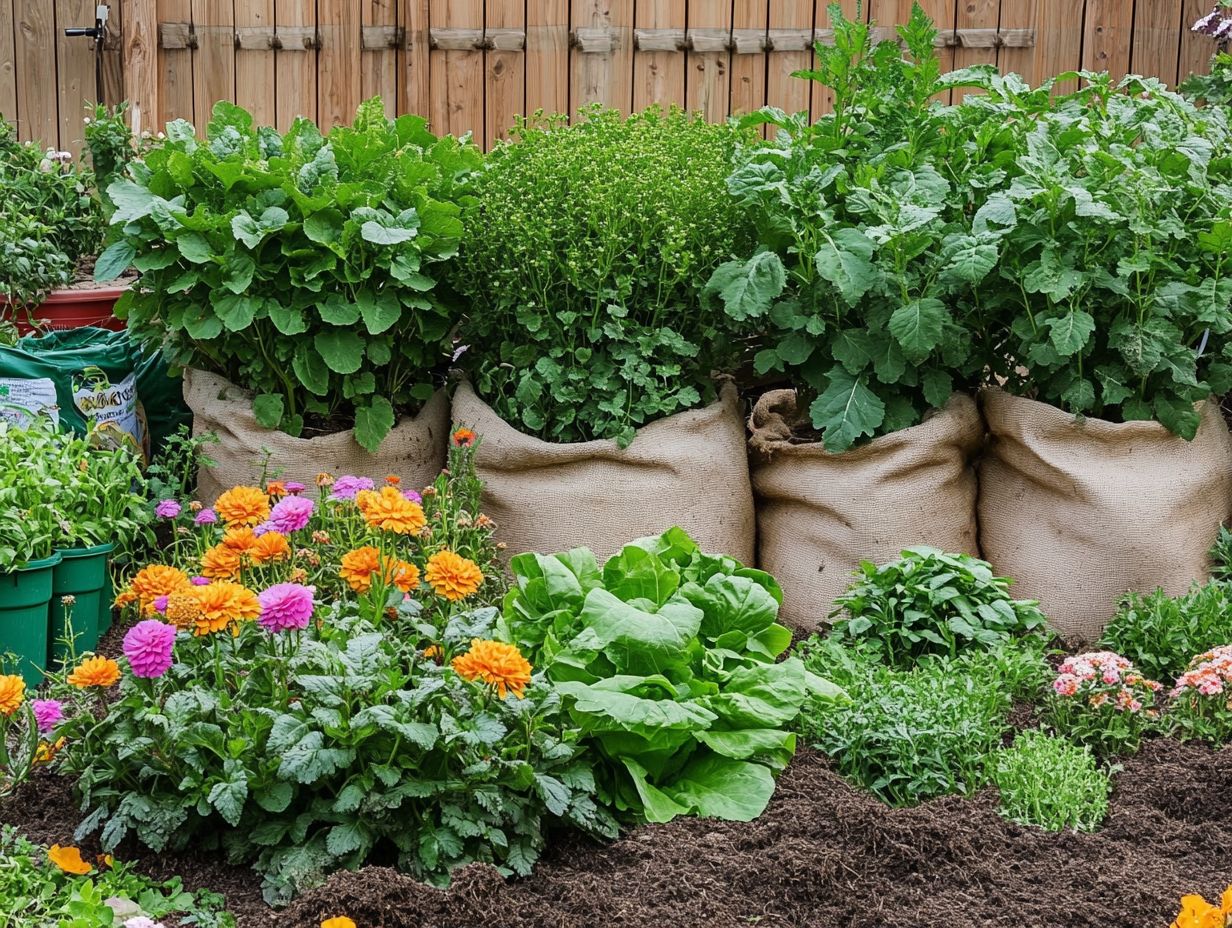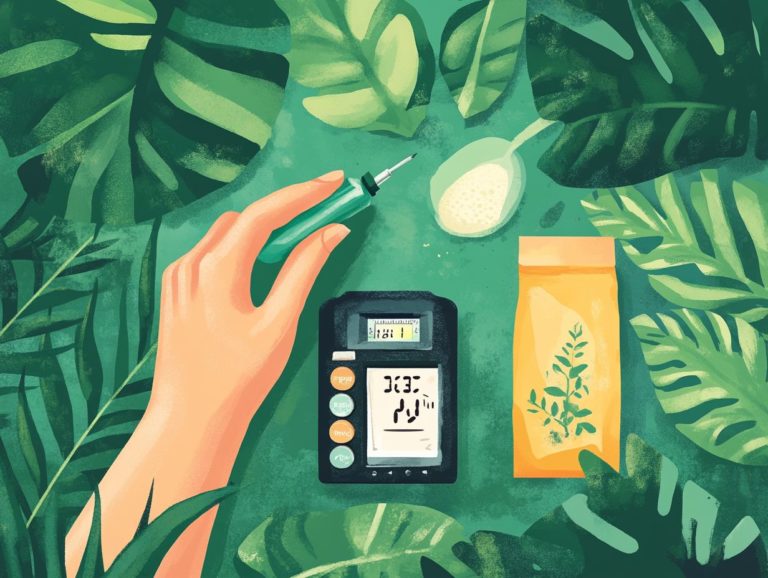Essential Nutrients for Thriving Plants
Nutrients are essential for your plants. They contribute to growth and overall health, leading to vibrant blooms and bountiful harvests.
In this article, you’ll explore macronutrients nitrogen, phosphorus, and potassium. You’ll also learn about vital micronutrients like calcium, magnesium, and sulfur.
You will discover how to recognize signs of nutrient deficiencies. Understanding nutrient management will help you keep your plants healthy.
You’ll find guidance on selecting the right balanced fertilizer. You ll also learn about NPK ratios to maximize your gardening success!
Contents
- Key Takeaways:
- The Role of Nutrients in Plant Growth
- Macronutrients for Plants
- Nitrogen, Phosphorus, and Potassium
- Micronutrients for Plants
- Calcium, Magnesium, and Sulfur
- Signs of Nutrient Deficiency in Plants
- Choosing the Right Fertilizer for Your Plants
- Common Questions About Nutrients for Your Plants
- What are essential nutrients, macronutrients, and micronutrients for thriving plants?
- What function do essential nutrients serve in plants?
- How do plants obtain essential nutrients?
- What happens if a plant lacks essential nutrients?
- Can plants get too much of an essential nutrient?
- How can I ensure my plants are getting all the essential nutrients they need?
Key Takeaways:

- Proper balance of macronutrients (nitrogen, phosphorus, and potassium) is crucial for healthy plant growth.
- Calcium, magnesium, and sulfur are important micronutrients that maintain plant health.
- Identifying and addressing nutrient deficiencies is essential for promoting optimal growth and preventing damage to the plants.
The Role of Nutrients in Plant Growth
Nutrients are vital to plant growth. They are foundational for many important plant functions, including nutrient uptake and chlorophyll production.
Key nutrients like nitrogen, phosphorus, and potassium enhance plant health. They promote root growth and ensure efficient nutrient uptake.
Understanding these nutrients is critical for sustainable agriculture and maximizing crop yields.
Why Nutrients are Essential
Essential nutrients are vital for your plants’ health and development. Nitrogen, phosphorus, and potassium are key players in processes like chlorophyll production and nutrient absorption.
You can categorize these nutrients into macronutrients and micronutrients. Macronutrients are required in larger quantities and serve specific functions in promoting growth.
Macronutrients, such as nitrogen, phosphorus, and potassium, are crucial for root development and flower formation. Micronutrients, including iron, manganese, zinc, copper, boron, and molybdenum, are needed in smaller amounts but are equally important for functions like enzyme activity and photosynthesis.
The availability of these nutrients in the soil affects how well your plants can absorb them. Imbalances can lead to deficiencies or nutrient toxicity, impacting growth and overall health.
Macronutrients for Plants
Macronutrients nitrogen, phosphorus, and potassium are the cornerstone of a plant’s nutritional needs. They play a pivotal role in growth and maintaining healthy soil.
These essential macronutrients promote strong root systems and ensure a well-rounded nutrient profile. They also maintain healthy soil, enhancing nutrient availability for robust crops.
The end result? Lush, thriving crops that flourish under your care!
Nitrogen, Phosphorus, and Potassium

Nitrogen, phosphorus, and potassium are essential nutrients for plants. They play a key role in plant growth and productivity.
Each nutrient has a unique function that contributes to overall plant health. Nitrogen is critical for developing proteins and chlorophyll, resulting in lush foliage. Phosphorus supports energy transfer, root development, and flowering. Potassium is vital for maintaining water balance and disease resistance.
When you ensure that plants efficiently absorb these nutrients such as through effective fertilizer application you set the stage for strong growth and increased productivity.
Deficiencies in any of these nutrients can stunt growth, hinder fruit development, and increase vulnerability to pests. Crafting a balanced nutrient management strategy is crucial for maximizing crop production.
Micronutrients for Plants
Micronutrients, while needed in smaller amounts, are important for the development and health of plants.
Essential micronutrients such as iron, manganese, zinc, copper, boron, and molybdenum enhance enzyme activity and improve nutrient availability, which is vital for strong crops.
These nutrients are crucial for healthy plant growth and overall vitality.
Calcium, Magnesium, and Sulfur
Calcium, magnesium, and sulfur are essential micronutrients that support vital processes in plants. They enhance nutrient composition, fortify cell structure, and promote overall health.
Each nutrient plays an interconnected role in fostering plant vigor and productivity. Calcium builds strong cell walls and regulates membrane permeability. Magnesium is essential for photosynthesis and nutrient absorption, as it is the central atom in chlorophyll. Sulfur is crucial for synthesizing amino acids and proteins, influencing plant metabolism.
The synergy between these micronutrients and others, like nitrogen and potassium, ensures effective absorption and utilization of essential resources. Deficiencies can lead to stunted growth, yellowing leaves, and reduced yields, highlighting the importance of maintaining optimal nutrient levels in cultivated crops.
Signs of Nutrient Deficiency in Plants
Recognizing the signs of nutrient deficiencies is vital for keeping your plants healthy. Symptoms can vary depending on which nutrient, such as nitrogen or phosphorus, is lacking.
Common deficiencies manifest as visible signs like stunted growth, yellowing leaves, and diminished crop quality, impacting overall plant health.
Being attentive to these signs empowers you to take necessary actions to nurture your plants back to health, ensuring optimal nutrient availability. Are you monitoring your plants for these signs?
Identifying and Addressing Deficiencies

Identifying and addressing nutrient deficiencies in your plants requires a thoughtful blend of soil testing and proactive nutrient management strategies. This includes targeted fertilizer application, understanding soil pH, and selecting the right nutrient sources.
To kick off this process effectively, conducting regular soil tests is essential. This will give you a solid understanding of existing nutrient levels, including soil nutrient content, pH balance, and organic matter in your soil.
Visual assessments of your plants can also be quite revealing. For example, if you notice yellowing leaves, it might signal a nitrogen deficiency. On the other hand, stunted growth could indicate insufficient phosphorus.
You can tackle these deficiencies with multiple approaches. Consider incorporating organic amendments like compost or opting for slow-release fertilizers that gradually provide nutrients over time. This enhances nutrient availability.
You can also implement a crop rotation plan to promote healthier plant growth and minimize future deficiencies.
By adopting this holistic strategy, you are resolving current issues while fostering long-term soil health. This will benefit your garden for years to come and ensure sustainable agriculture practices.
Choosing the Right Fertilizer for Your Plants
Choosing the right fertilizer can make your plants thrive and create a vibrant garden! It is crucial for guaranteeing optimal nutrient availability.
It’s essential to understand terms like balanced fertilizers, including organic and nitrogen fertilizers, as well as NPK ratios. This knowledge will help you make informed decisions that enrich your garden’s health.
Understanding NPK Ratios and Types of Fertilizers
Understanding NPK ratios is essential for grasping the nutrient composition of fertilizers. These ratios help guide you in selecting the right balanced fertilizer for effective nutrient management and application, ensuring optimal nutrient uptake.
NPK ratios represent nitrogen (N), phosphorus (P), and potassium (K). They help determine the ideal blend of nutrients to promote plant growth and development. For example, if you are cultivating leafy vegetables, a higher nitrogen content will serve you well. Phosphorus is crucial for enhancing root health and encouraging flowering.
You have a variety of fertilizers at your disposal, including:
- Organic options like compost and bone meal. These improve soil health and boost microbial activity.
- Synthetic fertilizers that deliver precise nutrients directly to your plants.
By utilizing these fertilizers according to their NPK ratios, you maximize your plants’ vigor. Additionally, you contribute to sustainable farming practices by minimizing nutrient runoff and preserving soil fertility. This ensures nutrient availability for future crops.
Common Questions About Nutrients for Your Plants
What are essential nutrients, macronutrients, and micronutrients for thriving plants?

Essential nutrients for thriving plants are specific minerals and compounds necessary for proper growth and development. These nutrients include nitrogen, phosphorus, potassium, calcium, magnesium, and sulfur.
What function do essential nutrients serve in plants?
Each essential nutrient plays a specific role:
- Nitrogen helps leaves and stems grow.
- Phosphorus supports root development.
- Potassium improves overall plant health and disease resistance, and enhances enzyme activity.
- Calcium is essential for strong cell walls.
- Magnesium is necessary for photosynthesis and chlorophyll production.
- Sulfur aids in protein synthesis.
Start applying these tips today for a flourishing garden!
How do plants obtain essential nutrients?
Plants obtain essential nutrients through their roots. They draw these nutrients from healthy soil or a hydroponic system.
Nutrients like nitrogen and phosphorus are absorbed through root hairs. They are then transported throughout the plant via the vascular system.
What happens if a plant lacks essential nutrients?
If a plant lacks essential nutrients, it shows signs of nutrient deficiency. Common symptoms include stunted growth, yellowing leaves, and fewer fruits or flowers.
In severe cases, the plant may even die.
Can plants get too much of an essential nutrient?
Yes, plants can suffer from having too much of a nutrient. This condition can be harmful, leading to issues like wilting and leaf burn.
In extreme cases, it can also cause death. It s crucial to follow recommended nutrient levels to keep plants healthy.
How can I ensure my plants are getting all the essential nutrients they need?
To make sure your plants receive all the essential nutrients, use a balanced fertilizer. This should contain all the necessary elements for healthy growth.
Regularly test your soil and hydroponic solution to check for nutrient levels. Adjust as needed to keep your plants thriving.
Don t forget! Providing proper sunlight and water will also help your plants absorb and use these nutrients effectively.






